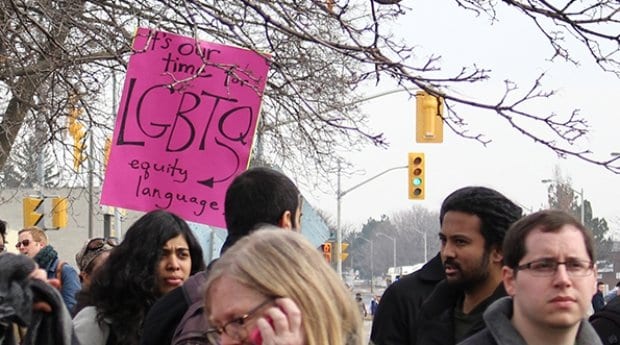York University’s administration is clashing with striking workers over whether lesbian, gay, bisexual and transgender people should be included in their collective agreement as an employment equity category.
When Canadian Union of Public Employees (CUPE) local 3903, who represent contract faculty, teaching, graduate and research assistants at York, went on strike March 3, it was over a list of demands that include tuition indexation, funding for masters students, and adding LGBT people as an employment equity category.
“It seems like a no brainer,” says Gregory Flemming, the grievance officer for CUPE 3903 and also a member of the bargaining team. “This group of people exist and are disadvantaged. Why should they not be taken into account when they are doing hiring practices?”
A spokesperson for York provided a statement to Daily Xtra explaining that its concern stemmed from the fact that LGBT people aren’t included as a designated group under the Employment Equity Act’s Federal Contractors program. York is a participant in the program.
Under Canada’s federal Employment Equity Act, which was first enacted in 1986, four groups are identified as employment equity categories — women; Aboriginal peoples; persons with disabilities; and members of visible minorities.
“York’s Employment Equity Plan depends on the availability of reliable statistical data on the proportionate representation of members of the groups in the workforce (national or regional). LGBTQ is not a designated Employment Equity Category under the Federal Contractors Program and there is not reliable statistical data on the proportionate representation of members of the LGBTQ group in the workforce as there is for the four designated groups,” the statement reads.
However, the University of Toronto, which is also a participant in the Federal Contractors program, includes a question asking “do you identify as a sexual minority” on their application for lecturers.
York’s administration has also already agreed to include LGBT people as an employment equity category if another employee group on campus successfully argues for it as a part of their collective agreement, a proposal it says came from CUPE 3903. Flemming told Daily Xtra in a follow-up email that to the best of his recollection, the proposal came from the employer’s side.
CUPE 3903’s Unit 2, which represents contract faculty, accepted an offer including revised provision on March 9. Flemming added in a follow-up email that Unit 1 and 3’s rejection of the collective agreement presented to the membership on March 9 was taken to mean that members were not willing to wait for LGBT equity language.
The York University Faculty Association (YUFA) is also renegotiating their collective agreement this year and Flemming says it is prepared to fight for the LGBT employment equity provision.
Within the rank-and-file membership, there remains frustration that York has not accepted what seems like a relatively modest and inexpensive proposal.
Michaela McMahon, a picket captain who works as a teaching assistant and is a PhD candidate in the faculty of environmental studies, says that when she spoke at the ratification meeting on March 9, she was surprised by how much support the LGBT employment equity designation had. “There is a real sense from people who identify on that spectrum on campus that they are tired of being invisibilized.”
Nael Bhanji, a teaching assistant who is currently a PhD candidate in the gender, feminist and women’s studies department at York, says he finds York’s position on LGBT employment equity insulting and problematic. “The fact that they are using our rights as a bargaining chip is ridiculous.”
“I’m actually a little ashamed to say I go to York right now,” Bhanji adds.
HG Watson can be reached at hg.watson@dailyxtra.com or @hg_watson on Twitter.


 Why you can trust Xtra
Why you can trust Xtra


